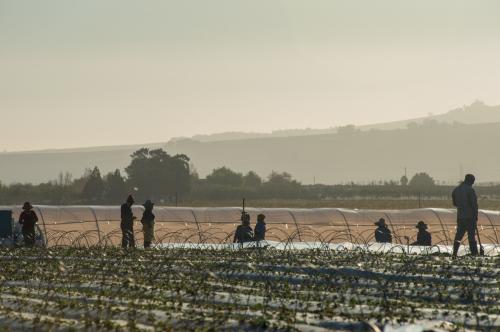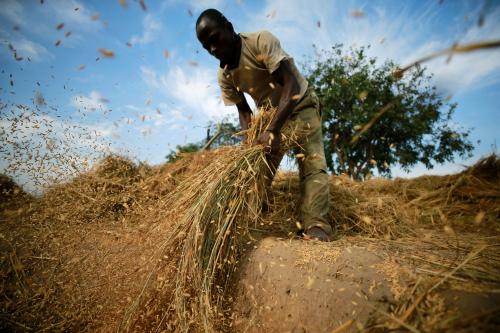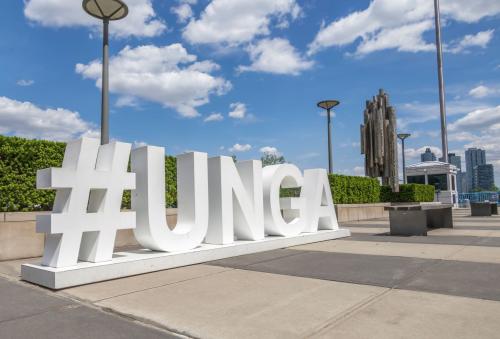African countries continue to weigh new debt relief options while facing COVID-19
On Thursday, February 11, the United Nations Economic Commission for Africa (UNECA) predicted that the economic damage inflicted by COVID-19 would influence more African nations to pursue debt relief through a new G-20 common framework that leverages the IMF to negotiate debt reduction from private and public creditors, thereby assisting countries in alleviating the economic and financial pressures of the pandemic. Early into the pandemic, the G-20 announced that it would implement a Debt Service Standstill Initiative (DSSI), suspending sovereign debt repayments for least developed countries through the end of 2020. The DSSI program has been extended until June 2021. So far, Chad, Ethiopia, and Zambia have requested debt relief through the new G-20 common framework. In November, though, Zambia became the first African nation to default on its debt since the pandemic struck.
Together with heavy reliance on fossil fuels for government revenue, diminished global oil demand and prices, and unsustainable debt burdens pre-COVID, UNECA emphasized that the strain on government revenues in Africa makes some countries, such as Angola and the Republic of the Congo, particularly vulnerable to pandemic-imposed economic distress. Bloomberg reports that in response to potential debt restructuring and associated fears of default, yields on African government-issued eurobonds have risen considerably. In fact, Ethiopia’s announcement that it would seek debt restructuring through the G-20 framework prompted a sell-off of its eurobonds, raising its yield 2.62 percentage points from 6.52 percent to 9.14 percent. Notably, not all experts agree on the extent of restructuring’s adverse impact on financing sovereign debt: Vera Songwe, executive director of UNECA and a nonresident senior fellow with Brookings Africa Growth Initiative, does not see the rise in African eurobond interest rates in response to participation in G-20 debt relief as a hindrance to their market access to sovereign debt issuance. In correspondence with Bloomberg news, she says that the high rate of return on African state issued eurobonds relative to the rest of the world still makes African eurobonds attractive to investors.
The Brookings Africa Growth Initiative has been following African debt sustainability and COVID-19 very closely. For more on this issue, read “Debt sustainability and financing for development: A key post-COVID challenge,” “Africa needs debt relief to fight COVID-19,” and “COVID-19 and debt standstill for Africa: The G-20’s action is an important first step that must be complemented, scaled up, and broadened.”
Similarly, for more on African finances relating to COVID-19, read “The unfinished agenda of financing Africa’s COVID-19 response” and “How to ensure Africa has the financial resources to address COVID-19”
Food prices spike in response to rising commodity prices, currency depreciation, and COVID-19 interruptions
Last month, according to the United Nations, food prices hit six-year highs in emerging markets, making eight consecutive months food prices have increased. The Food and Agriculture Organization’s Food Price Index, which tracks monthly changes in the international prices of commonly-traded food commodities, reached its highest level since July 2014, with spikes of over 5 percent in its Cereal Price Index, Vegetable Oil Price Index, and Sugar Price Index, from the month before.
Food prices often rise alongside the price inflation of nonfood goods, which has been on the rise in Africa in general: According to Reuters, Nigeria hit double-digit inflation on food prices in recent months. Namibia saw food inflation rates of 7 percent, and the Seychelles, at least 15 percent (almost 30 percent for fish). Angola saw its annual inflation rate spike to 25 percent.
These hikes in food prices will exacerbate food insecurity around the world according to the World Food Program. In 2020 alone, up to 96 million additional people across 54 IDA countries were pushed into acute food insecurity, bringing the total to 233 million people by the end of last year.
For a closer look at how COVID-19 has hit African households’ food security, see “Figures of the week: The effect of COVID-19 on food and income security in Africa.” For more on how COVID-19 has disrupted food supply chains, see the June 2020 blog, “Economic impact of COVID-19: Protecting Africa’s food systems from farm to fork.” For strategies on securing food security during the pandemic, see “Protecting food security in Africa during COVID-19.”
South Africa halts the rollout of AstraZeneca’s COVID-19 vaccine
On Sunday, South African health officials announced that they will suspend the country’s deployment of AstraZeneca’s COVID-19 vaccine following results of a study by South Africa’s University of Witwatersrand that suggest the vaccine offered only “minimal protection” from mild and moderate forms of new coronavirus strain B.1.351 (also known as the 501Y.V2 variant), increasingly the dominant strain within the country. The study, which has been submitted for peer review and will soon be released to the public, involved roughly 2,000 volunteers, about half of whom received the AstraZeneca vaccine and half of whom received a placebo. Neighboring eSwatini followed on Tuesday that it would also not be using the AstraZeneca vaccine.
South Africa still plans to weigh the best use of the previously acquired 1.5 million doses of the AstraZeneca vaccine. Indeed, it remains unclear whether the vaccine will offer robust protection against severe forms of the disease stemming from the new variant, which accounts for 90 percent of new cases in South Africa. In the meantime, health officials are turning their attention to the deployment of the Johnson & Johnson vaccine, which has demonstrated efficacy against the new variant and whose first batch of doses are expected in a few days. Notably, unlike the other vaccines currently available, the one by Johnson & Johnson requires only one shot instead of two set weeks apart. South Africa has totaled nearly 1.5 million cases and over 46,000 deaths since the beginning of the pandemic.
In response to the announcement of lowered efficacy, the African Union announced it would not be “walking away” from the AstraZeneca shot given that only six other countries have reported the variant.
Also this week, Zimbabwe acquired 800,000 doses of China’s Sinopharm vaccine, including 200,000 doses China donated to Zimbabwe. The doses, which are due to arrive next month, are a welcome relief for the African nation, which is just emerging from a second wave of cases. The second surge in Africa has been felt across the continent. On Thursday, Air Namibia suspended its operations and canceled all scheduled flights, laying off its 600 employees.








Commentary
Africa in the news: African debt, rising food prices, and vaccine updates
February 13, 2021